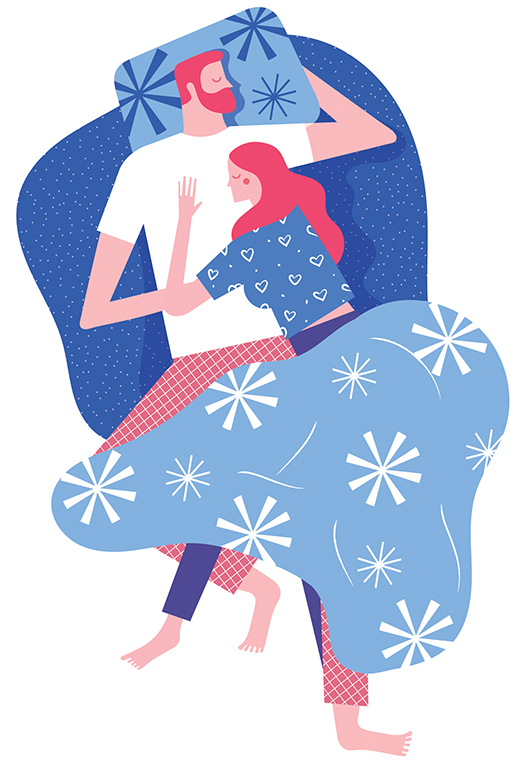
Illustration by Veronica Grech
Despite working early hours, Andy Carter has no trouble functioning during the week. The weekend is a different story.
On weekdays, Carter (not his real name) goes to bed at 8 pm and rises at 4 am to allow time for his commute from Bergen County to New York City. Monday through Friday, he feels rested and is productive at work. But on Saturday nights around 7 pm while eating dinner with his wife and friends, he frequently nods off.
Convinced he had a sleep disorder, Carter’s wife suggested he visit a specialist. Dr. John Villa, director of the Institute for Sleep/Wake Disorders at Hackensack Meridian Health Hackensack University Medical Center, had a simple answer: You don’t have a sleep disorder. You’re just not sticking to your sleep schedule.
Carter was experiencing social jet lag. By breaking his nightly sleep routine on the weekends, his biological and social time zones were misaligned. He is not alone. “Everybody works very hard and gets up early. Then they want to stay up late,” says Villa. “You can’t burn the candle at both ends.”
Our bodies require a routine to maintain maximum health. That’s true for eating, exercising and sleeping. But too often, our schedules are overbooked and our sleep cycles suffer.
Another common sleep pitfall is sleep debt, the cumulative effect of not getting enough sleep. Some people settle for insufficient sleep during the work week, thinking they can catch up on zzz’s on the weekend. “The sleep scientists don’t think we really make up for it,” says Villa.
The solution to these poor sleep patterns is proper sleep hygiene, the practices needed to achieve quality sleep at night and alertness during the day. These guidelines begin with waking up at the same time seven days a week after getting the appropriate amount of shuteye, which varies based on age. The Centers for Disease Control and Prevention recommends adults get at least seven hours of sleep each night. Dr. Eric Sztejman, a specialist board certified in sleep medicine at Virtua Medical Group, says adults ages 25-72 need seven to nine hours of sleep nightly.
“We need to prepare ourselves to get that amount of sleep so we can actually rejuvenate, rest, relax and allow certain parts of the body to restore [themselves],” says Sztejman.
One process that occurs while we sleep is memory consolidation. Our brains “take short-term memory and change it into long-term memory,” says Sztejman. Inadequate sleep can interfere with this process, leading to memory impairments such as difficulty concentrating. Other health consequences associated with chronic poor sleep include high blood pressure, increased stress levels, rapid heart rate, weight gain, a weakened immune system and increased risk of cardiovascular diseases. To keep bodily functions in balance—a state known as homeostasis—“sleep is probably necessary—the right quantity and at the right time,” says Villa.
Altogether, humans sleep about one-third of their lives—or at least they should. Yet, according to the American Sleep Association, about 35 percent of adults report getting less than seven hours of sleep during a typical 24-hour period. One explanation for insufficient rest could be that people aren’t properly preparing for slumber. According to the National Sleep Foundation’s Sleep in America Poll 2018, 90 percent of participants say their day starts when they get up, rather than when they go to sleep the night before. All of the activities we engage in throughout the day affect our sleep that night. Exercising before bed, drinking alcohol and caffeine late in the day, and spending excessive time in front of electronics impair sleep quality.
Villa and Sztejman stress that technology containing blue light, which stimulates the brain, interferes with a good night’s sleep. Blue-light emitting devices include televisions, computers, tablets and smartphones.
To cut back on our exposure to blue light, Villa suggests using the “night shift” setting on the iPhone (Android users need to download the Night Shift app), which transforms the colors of the screen to the warmer end of the color spectrum after dark.
Villa also finds the “bedtime” feature on the iPhone alarm clock to be helpful when developing and sticking to a sleep schedule. This tool allows users to set a bedtime reminder, track their sleep history and choose a pleasant-sounding alarm.
“The software/hardware people have heard the sleep community,” says Villa. “People are making their sleep worse with these devices. So they’ve tried to respond.”
Villa recommends using your bed only for sleep and sex. Other suggestions: Write down troubling thoughts on a piece of paper several hours before bed, dim the lights in the bedroom at night, place your smartphone across the room while sleeping, and avoid devices altogether two hours prior to bedtime.
Sztejman suggests getting rid of all distractions about 30 minutes before your head hits the pillow. “[This] allows your body to get in the mood to actually sleep.”
Ultimately, you’ve got to establish—and stick to—a healthy sleep routine. “It’s amazing how many things get better,” says Villa, “and how many things fall apart if you don’t.”



